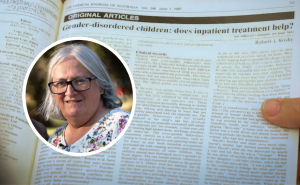From today, Queenslanders born in the state and overseas will have a simpler, easier way to change the sex listed on their birth certificate.
The new process eliminates the previous requirement for trans people to have surgery before applying to amend their birth certificates. This change recognises the diverse ways in which people experience and express their gender, as well as the prohibitive barriers to surgery many trans people face.
Rather than providing evidence of surgery, the new process requires adult applicants to provide proof of identity, a statutory declaration, and a supporting statement by someone the applicant has known for at least 12 months. The form also states that “If the sex shown on your current ID is different to the sex on your birth certificate, you must provide evidence showing how you updated your sex on your ID—for example a recognised details certificate from another state or territory.”
People under the age of 16, who were previously unable to change their legal documentation due to being ineligible for surgery, will also be able to apply to change their birth certificates. These applicants must also provide a report from a developmentally-informed practitioner, as well as ID, a statutory declaration, and a supporting statement. The Queensland Department of Births, Deaths and Marriages states that “The report is not an assessment of the child’s sense of their own gender identity, or whether transitioning is right for them [but rather] is to confirm that the child understands both the legal implications, and meaning of altering their record of sex.”
As of the 24th of June 2024, the cost will be $126.10 for the process itself, plus $54.40 to $108.80 for the issuing of new birth certificates, depending on the type selected.
The new process also allows people to change their first and middle names as part of the application – but not their surname. People wanting to change their surname will need to go through a separate change of name process, after the change of sex application has been finalised.
This change represents a pivotal shift in the state’s approach to gender recognition, aligning Queensland with other most other states in Australia.
As well as simplifying the process, it also permits non-binary and gender-diverse individuals to write in their own sex descriptor, rather than being constrained to the binary options of ‘male’ or ‘female.’ The legislation also allow birth certificates for newborns to list two mothers, fathers or nonbinary parents.
Equality Australia’s Ymania Brown told the ABC that “Queensland was one of the last places in Australia to have cruel and outdated legal barriers that deny many trans people ID that accurately reflects their gender.”
The SBS reports that the LNP opposed the laws, arguing that these changes were a threat to women-only spaces and would have a negative impact on women’s sports.
“This bill is an attack on women, it is an attack on women’s rights and it’s an attack on young girls,” deputy LNP leader Jarrod Bleijie told parliament.
Shannon Fentiman, Attorney-General at the time, noted “Despite repeated claims to the contrary, there is no evidence from any jurisdiction to suggest that women will have fewer rights or be less safe.”
In a press release on the passing of the legislation last year, Attorney-General Yvette d’Ath stated “This historic bill belongs to those in the LGBTIQA+ community who despite facing the brunt of vitriol, discrimination and hate have chosen to stand up and fight for legal recognition.
“I’m proud to pass these new laws that ensure every Queenslander can have their legal identity align with their lived identity.
“These laws also recognise same-sex and gender diverse parents by acknowledging the undeniable reality that a child can have more than one mother and more than one father.”
“I want Queensland’s rainbow community to know: your lives matter, your stories matter, and your struggles matter.”




